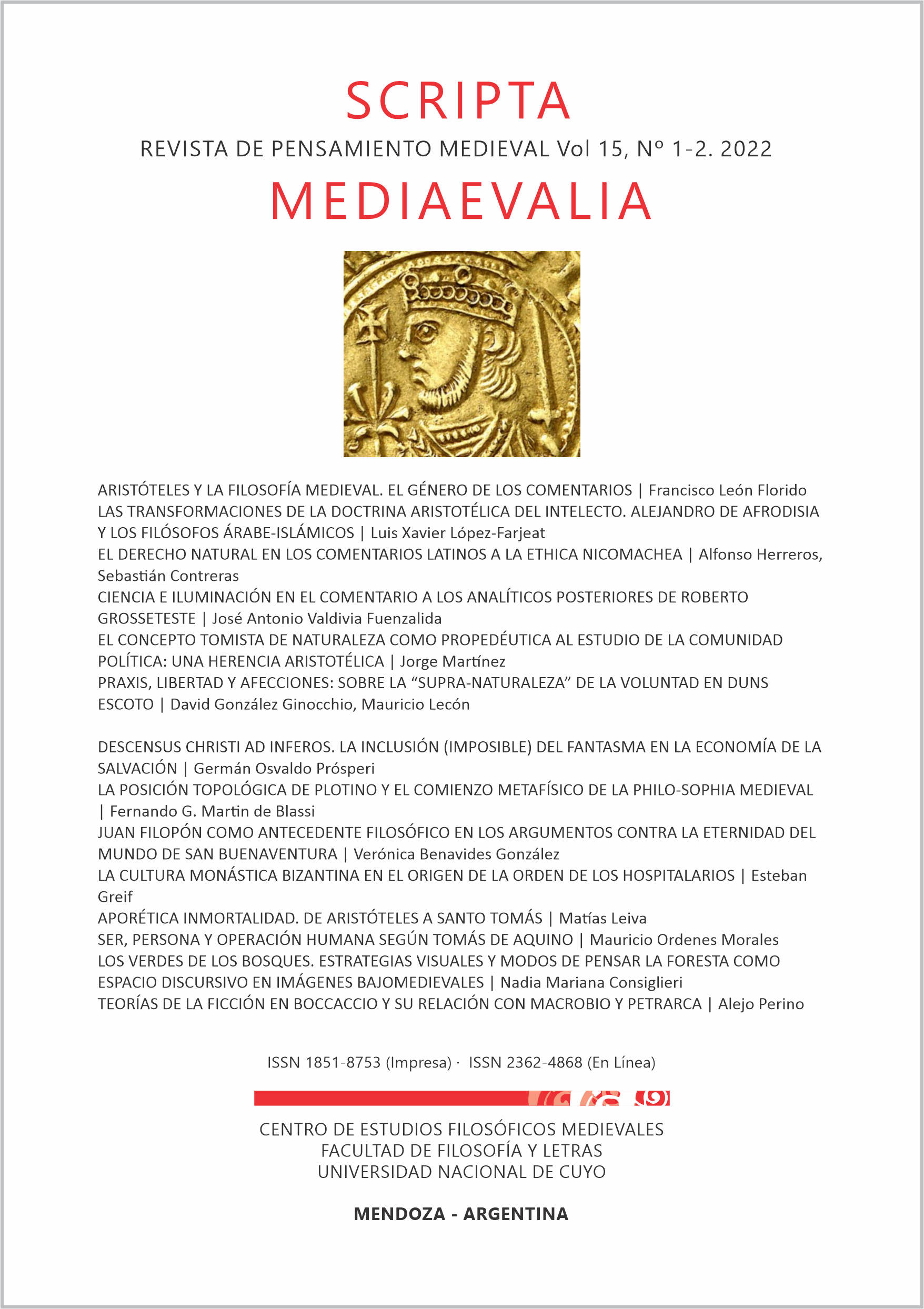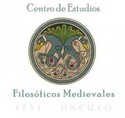The Topological Position of Plotinus and the Metaphysical Beginning of Medieval philo-SOPHIA
DOI:
https://doi.org/10.48162/rev.35.016Keywords:
absolute difference, Plotinus, hypostatic procession, selfAbstract
This paper aims to understand the metaphysical originality of the plotinian philosophy, by responding to a reading favored by the Enneads. It is adopted for the analysis of the texts a topological and not merely historiographic interpretation criterion. From the doctrinal point of view, the Plotinus’ rational thought is considered as the first satisfactory answer to the unprecedented historical irruption of the medieval principle about the absolute difference between the first cause and its effects. The munificent power of the One-Good, transcendent even to the categorical order, demands a conversion of intelligence, insofar as the intelligible substance constitutes itself only when it turns towards its own origin. In this sense, even if the first principle is made known through vestiges, it is not for this reason that it is dispersed in the multiple but that it conserves the world through an incessant donation of being.
References
Aristote. L’Éthique à Nicomaque, introd., trad. et comm. par R.-A. Gauthier et J.-Y. Jolif. Louvain-Paris: Publications Universitaires/Béatrice-Nauwelaerts, 1970.
Aristotelis Ethica Nicomachea, ed. por J. Bywater. Oxford Clarendon Press, 1894. Aristóteles. Metafísica de Aristóteles, ed. trilingüe prep. por V. García Yebra. Madrid: Gredos, 1998. Armstrong, A. H. “Plotinus”, en The Cambridge History of Later Greek and Early Medieval Philosophy, ed. por A. H. Armstrong, Part III: 193-268. Cambridge: University Press, 1967.
Baine Harris, R. The Significance of Neoplatonism. Norfolk: Suny Press, 1976.
Boeder, H. “Hacia lo que está delante”, trad. inédita de M. Zubiria. Mendoza, 17-01-21. La versión original corresponde a “Gegenwärts”, epílogo al libro del autor: Die Installationen der Submoderne. Zur Tektonik der heutigen Philosophie, 415-424. Würzburg: Königshausen & Neumann, 2006 (Orbis Phaenomenologicus, Bd. 15).
Boeder, H. “¿Por qué motivo ser del ente?”, “¿Qué consuma la filosofía primera?”, “La distinción de la razón” y “Actuar y/o habitar”, In officium Sapientiae. Antología de textos filosóficos, trad. de M. Zubiria, vol. I: 17-45, 47-66, 125-137, 139-152. Mendoza: UNCuyo-FFyL, 2017. http://bdigital.uncu.edu.ar/objetos_digitales/8889/in-officium-sapientiae-i-corr-.pdf
Boeder, H. “El límite de la modernidad y el legado de Heidegger”, “Veritas seditiosa”, “La memoria de la sophia” y “Lo estimulante del pensamiento de Heidegger”, In officium Sapientiae. Antología de textos filosóficos, trad. de M. Zubiria, vol. II: 15-36, 63-78, 79-99 y 101-112. Mendoza: UNCuyo-FFyL, 2017. http://bdigital.uncu.edu.ar/objetos_digitales/8890/in-officium-sapientiae-ii-corr-.pdf
Boeder, H. “Introducción a la racionalidad del Nuevo Testamento”, “Las concepciones filo-sóficas de la Época Media” y “El presente de la Sapientia Christiana en la esfera del lenguaje”, In officium Sapientiae. Antología de textos filosóficos, trad. de M. Zubiria, vol. III: 15-33, 35-58, 59-77. Mendoza: UNCuyo-FFyL, 2017. http://bdigital.uncu.edu.ar/objetos_digitales/8891/in-officium-sapientiae-iii-corr-.pdf
Boeder, H. Topología de la Metafísica: la Época Media. Trad., epílogo y notas de M. Zubiria. Pamplona: EUNSA, 2009. Boeder, H. “Die Tektonik des submodernen Denkens im Schein ihrer Kunst”. Sapientia nº 54 (1999): 173-185.
Boeder, H. “Logotektonisch Denken”. Sapientia nº 53 (1998): 15-24.
Boeder, H. Das Vernunftgefüge der Moderne. Friburgo-Munich: Alber, 1988.
Boeder, H. Topologie der Metaphysik. Friburgo-Munich: Alber, 1980.
Chantraine, P. Dictionnaire étymologique de la langue grecque. Histoire des mots. Paris: Éd. Klincksieck, vol. I: 1968, vol. II: 1970, vol. III: 1974, vol. IV-1: 1977, vol. IV-2: 1979.
Charrue, J. M. Plotin lecteur de Platon. Paris: Les Belles Lettres, 1978.
Dillon, J. The Middle Platonists 80 B. C. to A. D. 220. New York: Cornell University Press, 1996.
Dörrie, H. “Ὑπόστασις. Wort – und Bedeutungsgeschichte” & “Zum Ursprung der neuplatonischen Hypostasenlehre”. en Platonica minora (Studia et Testimonia Antiqua VIII), 12-69, 286-296. Munich: W. Fink Verlag, 1976.
Dodds, E. R. Pagan and Christian in an Age of Anxiety: some aspects of religious experience from Marcus Aurelius to Constantine. Cambridge: University Press, 1965.
Fabro, C. Opere complete XIX: Partecipazione e causalità secondo S. Tommaso d’Aquino. Roma: EDIVI, 2010.
García Gual, C. Epicuro. Madrid: Alianza editorial, 2013.
Hadot, P. ¿Qué es la filosofía antigua?, trad. de E. Cazenave Tapie Isoard, Rev. técnica de Mª I. Santa Cruz. México: FCE, 1998.
Hadot, P. “Etre, Vie, Pensée chez Plotin et avant Plotin”, en Les sources de Plotin (Entretiens sur l’Antiquité Classique V), ed. por E. R.
Dodds, 105-141. Genève: Fondation Hardt, 1960.
Henry, P. “Le problème de la liberté chez Plotin”. Revue Neo-scolastique de Philosophie nº 29 (1931): 50-79, nº 30 (1931): 180-215 y nº 31 (1931): 318-339.
Herrera, J. J. La simplicidad divina según santo Tomás de Aquino. San Miguel de Tucumán: Ed. de la UNSTA, 2011.
Inge, W. R. The Philosophy of Plotinus, vol. I-II. London: Longmans, 19483.
Jeuneau, É. Néoplatonisme et Philosophie Médiévale. Turnhout: Brepols, 1997.
Kremer, K. Die neuplatonische Seinsphilosophie und ihre Wirkung auf Thomas von Aquin. Leiden: Brill, 1966.
Merlan, Ph. From Platonism to Neoplatonism. The Hague: Martinus Nijhoff, 1968. Numénius. Fragments, éd., trad. française et comm. par É. des Places. Paris: Les Belles Lettres, 1973.
des Places, É. “La théologie négative du Pseudo-Denys : ses antécédents platoniciens et son influence au seuil du Moyen Age”, en
Studia Patristica, ed. por E.-A. Livingstone, vol. XVII: 81-92. Oxford, New York, Toronto, Sydney, Paris, Frankfurt: Pergamon Press, 1982.
Platonis opera, ed. por J. Burnet. Oxford Clarendon Press, vol. 1: 1900; vol. 2: 1901, vol. 3: 1903, vol. 4: 1902, vol. 5: 1907.
Plotini Enneades cum Marsilii Ficini interpretatione castigata, ed. por F. Creuzer & G. H. Moser. Paris: Didot, 1896. Plotini opera, ed. por P. Henry & H.-R. Schwyzer. Oxford: University Press, vol. 1: 1964, vol. 2: 1977, vol. 3: 1982 (ed. minor).
Plotini opera ed. por P. Henry & H.-R. Schwyzer. Leiden: Brill, vol. 1: 1951, vol. 2: 1959, vol. 3: 1973 (ed. maior).
Plotin. Ennéades (6 vols.), éd. et trad. de É. Bréhier. Paris: Les Belles Lettres, 1924-1938.
Plotin. Traité 38 (VI 7), introd., trad., comm. et notes par P. Hadot. Paris: Cerf, 1988.
Plotino. Enneadi, prima versione integra e commentario critico di V. Cilento. Bari: Gius. Laterza & Figli, vol. 1: 1947, vol. 2: 1948, vol. 3 a y b: 1949.
Plotino. Paideia antignostica. Ricostruzione d’ un unico scritto da Enneadi III 8, V 8, V 5, II 9, ed. por V. Cilento. Firenze: Felice le Monnier, 1971. Plotinus. The Six Enneads, trans. by S. MacKenna & B. S. Page. Chicago: University of Chicago, Encyclopaedia Britannica, 1952.
Plotinus. Über Ewigkeit und Zeit (Enn. III 7), trad. por W. Bierwaltes. Frankfurt a. M.: Klosterman, 1981.
Porfirio. Vida de Plotino / Plotino. Enéadas I-II, III-IV, V-VI, introd., trad. y notas de J. Igal Alfaro. Madrid: Gredos, vol. 1: 1982, vol. 2: 1985, vol. 3: 1998.
Porphyry. On the life of Plotinus and Plotinus. Enneads in Seven Volumes, engl. trans. by A. H. Armstrong. Cambridge-Massachusetts: Harvard University Press, vol. 1: 1989, vol. 2: 1966, vol. 3: 1967, vol. 4: 1984, vol. 5: 1984, vol. 6 y 7: 1988.
Praechter, K. “Die griechischen Aristoteleskommentare”. ByZ (1909): 516-538.
Proclus. The Elements of Theology, ed. por E. R. Dodds. Oxford: Clarendon Press, 19632.
Radice, R. Lexicon II Plotinus. Milano: Università Vita-Salute S. Raffaele, 2004.
Rist, J. M. Plotinus: The Road to Reality. Cambridge: University Press, 1967.
Romano, F. Il neoplatonismo. Roma: Carocci editore, 1998.
Sacchi, M. E. “La afirmación de la trascendencia de Dios en la doctrina cristiana y en las conclusiones de la filosofía primera”. Sapientia L, nº 195-196 (1995): 149-183.
Santa Cruz, Ma I. “Modos de conocimiento en Plotino”. Estudios de Filosofía nº 34 (2006): 201-216.
Santa Cruz, Ma I. “Plotino y el neoplatonismo”, en Historia de la Filosofía Antigua, ed. por C. García Gual, 339-361. Madrid: Enciclopedia Iberoamericana, 1997.
Sleeman, J. H. & G. Pollet. Lexicon Plotinianum. Leiden-Leuven: Brill, 1980.
Soto-Bruna, Ma J. “El neoplatonismo”, en Historia universal del pensamiento filosófico, ed. por A. S. Naya, I: 587-598. Ortuella: Vizcaya, 2007. von Stein, H. Sieben Bücher zur Geschichte des Platonismus. Göttingen: Vandenhoeck & Ruprecht, 1864.
Stoicorum Veterum Fragmenta, ed. por H. von Arnim, vol. I-IV. Stuttgart: Teubner, 1968.
Thomas d’Aquin & Dietrich de Freiberg. L’Être et l’essence. Le vocabulaire médiéval de l’ontologie, trad. et comm. par A. De Libera et C. Michon. Paris: Éd. du Seuil, 1996.
Thomas d’Aquin. Les créatures spirituelles, introd., trad. et notes par J.-B. Brenet. Paris: Vrin, 2010.
Vassallo, Ch. La dimensione estetica nel pensiero di Plotino. Proposte per una nuova lettura dei trattati Sul bello e Sul bello intelligibile. Napoli: Giannini Editore, 2009.
Whittaker, J. “ΕΠΕΚΕΙΝΑ ΝΟΥ ΚΑΙ ΟΥΣΙΑS”. Vigilia Christianae nº 23 (1969): 91-104.
Whittaker, Th. The Neo-Platonists, Cambridge, University Press, 1928.
Wippel, J. “The Latin Avicenna as a Source for Thomas Aquinas’s Metaphysics”. Freiburger Zeitschriftfur Philosophie nº 37 (1990): 79-81.
Zubiria, M. Notas para un seminario sobre un tratado de Plotino: “Sobre cómo advino a la existencia la muchedumbre de las ideas y sobre el Bien” (VI 7). Mendoza: Cátedra de Metafísica, FFyL-UNCuyo, 2019 (inédito).
Zubiria, M. “Epílogo: Ἀδύνατον, ἄλογον, ἄτοπον. Sobre el descubrimiento boederiano de la Época Media de la filo-sofía”, en In officium Sapientiae. Antología de textos filosóficos, vol. III: 131-144. Mendoza: UNCuyo-FFyL, 2017. http://bdigital.uncu.edu.ar/objetos_digitales/8891/in-officium-sapientiae-iii-corr-.pdf.
Zubiria, M. “BOEDER, Heriberto. Die Installationen der Submoderne. Zur Tektonik der heutigen Philosophie. [Las instalaciones de la Submodernidad. Acerca de la tectónica de la filosofía actual]. Würzburg: Königshausen & Neumann (Orbis Phaenomenologicus, Bd. 15), 2006. XI + 433 p.”. Kriterion nº 121 (2010): 305-312. https://www.scielo.br/j/kr/a/WBjdmHgRrdWfQmLCmGTZCyS/?format=pdf&lang=es
Zubiria, M. Lecciones sobre la distinción de la razón. Desde la analítica del lenguaje hacia los portavoces de la sabiduría occidental. Buenos Aires: Ed. Quadrata, 2006.
Downloads
Published
How to Cite
Issue
Section
License

This work is licensed under a Creative Commons Attribution-NonCommercial-ShareAlike 3.0 Unported License.






































